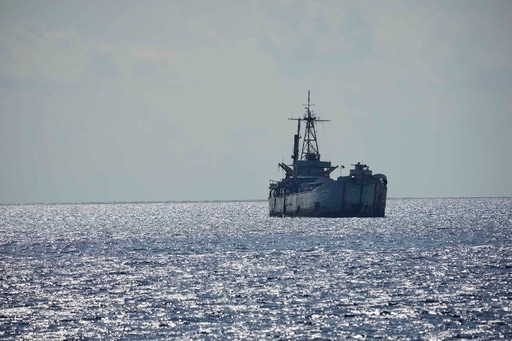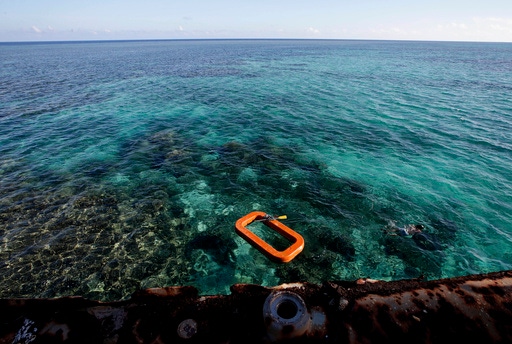China blames Philippines for ship collision in South China Sea. Manila calls the report deceptive

FILE - Philippine navy ship BRP Sierra Madre is seen at the Second Thomas Shoal, locally known as Ayungin Shoal, at the South China Sea, April 23, 2023. A Chinese vessel and a Philippine supply ship collided near the disputed Spratly Islands in the South China Sea on Monday, June 17, 2024, China's coast guard said.(AP Photo/Aaron Favila)[ASSOCIATED PRESS/Aaron Favila]
TAIPEI (AP) — A Chinese vessel and a Philippine supply ship collided near the disputed Spratly Islands in the South China Sea on Monday, China’s coast guard said, in the latest flare-up of escalating territorial disputes that have sparked alarm.
The coast guard said a Philippine supply ship entered waters near the Second Thomas Shoal, a submerged reef in the Spratly Islands, part of a territory claimed by several nations.
The Philippines says the shoal falls within its internationally recognized exclusive economic zone and often cites a 2016 international arbitration ruling invalidating China’s expansive South China Sea claims based on historical grounds.
The Chinese coast guard said the Philippine craft “ignored China’s repeated solemn warnings … and dangerously approached a Chinese vessel in normal navigation in an unprofessional manner, resulting in a collision.”
“The Philippines is entirely responsible for this,” the coast guard said in its statement on the social media platform WeChat.
Meanwhile, the Philippine military called the Chinese coast guard’s report “deceptive and misleading,” and said it would “not discuss operational details on the legal humanitarian rotation and resupply mission at Ayungin Shoal, which is well within our exclusive economic zone.”
It used the Philippine name for the shoal, where Filipino navy personnel have transported food, medicine and other supplies to a long-grounded warship that has served as Manila’s territorial outpost.
“We will not dignify the deceptive and misleading claims of the China coast guard,” military spokesperson Col. Xerxes Trinidad said. “The main issue remains to be the illegal presence and actions of Chinese vessels within the Philippines’ exclusive economic zone, which infringes on our sovereignty and sovereign rights.”
“The continued aggressive actions of the CCG are escalating tensions in the region,” Trinidad said.
Two speedboats — attempting to deliver construction materials and other supplies to a military vessel stationed at the shoal — accompanied the supply ship, according to China’s Foreign Ministry, which described its coast guard’s maneuver as “professional, restrained, reasonable and lawful.”
The Foreign Ministry did not expand on the extent of the damage to the Chinese or Philippine vessels.
Several incidents have happened in recent months near the shoal which lies less than 200 nautical miles (370 kilometers) from The Philippines coast and where it maintains an outpost aboard the BRP Sierra Madre, which had been encrusted with rust since it was deliberately grounded in 1999 but remains an actively commissioned military vessel, meaning an attack on it could be considered by the Philippines as an act of war.
China has increasingly become assertive in pressing its claim to virtually the entire South China Sea, which has led to a rising number of direct conflicts with other countries in the region, most notably the Philippines and Vietnam.
A new law by China, which took effect Saturday, authorizes its coast guard to seize foreign ships “that illegally enter China’s territorial waters” and to detain foreign crews for up to 60 days. The law renewed a reference to 2021 legislation that says China’s coast guard can fire upon foreign ships if necessary.
At least three coastal governments with claims to the waters — the Philippines, Vietnam and Taiwan — have said they would not recognize the law.
The territorial disputes have strained relations and sparked fears the conflict could bring China and the United States, a longtime treaty ally of the Philippines, into a military confrontation. Washington lays no territorial claims to the busy seaway, a key global trade route, but has warned that it’s obligated to defend the Philippines if Filipino forces, ships and aircraft come under an armed attack in the South China Sea.
Aside from China, the Philippines, Vietnam and Taiwan, Malaysia and Brunei are also involved in the long-seething territorial disputes, which are regarded as a flashpoint in Asia and a delicate fault line in the longstanding U.S.-China rivalry in the region.
Indonesia has also confronted Chinese coast guard and fishing fleets in the past in the gas-rich waters off the Natuna islands in the fringes of the South China Sea where it blew Chinese fishing boats it had taken under custody. Its navy also fired warning shots at Chinese vessels straying into what Jakarta regards as its exclusive economic zone.
___
Gomez contributed from Manila, Philippines.
Copyright 2024 The Associated Press. All rights reserved. This material may not be published, broadcast, rewritten or redistributed without permission.
